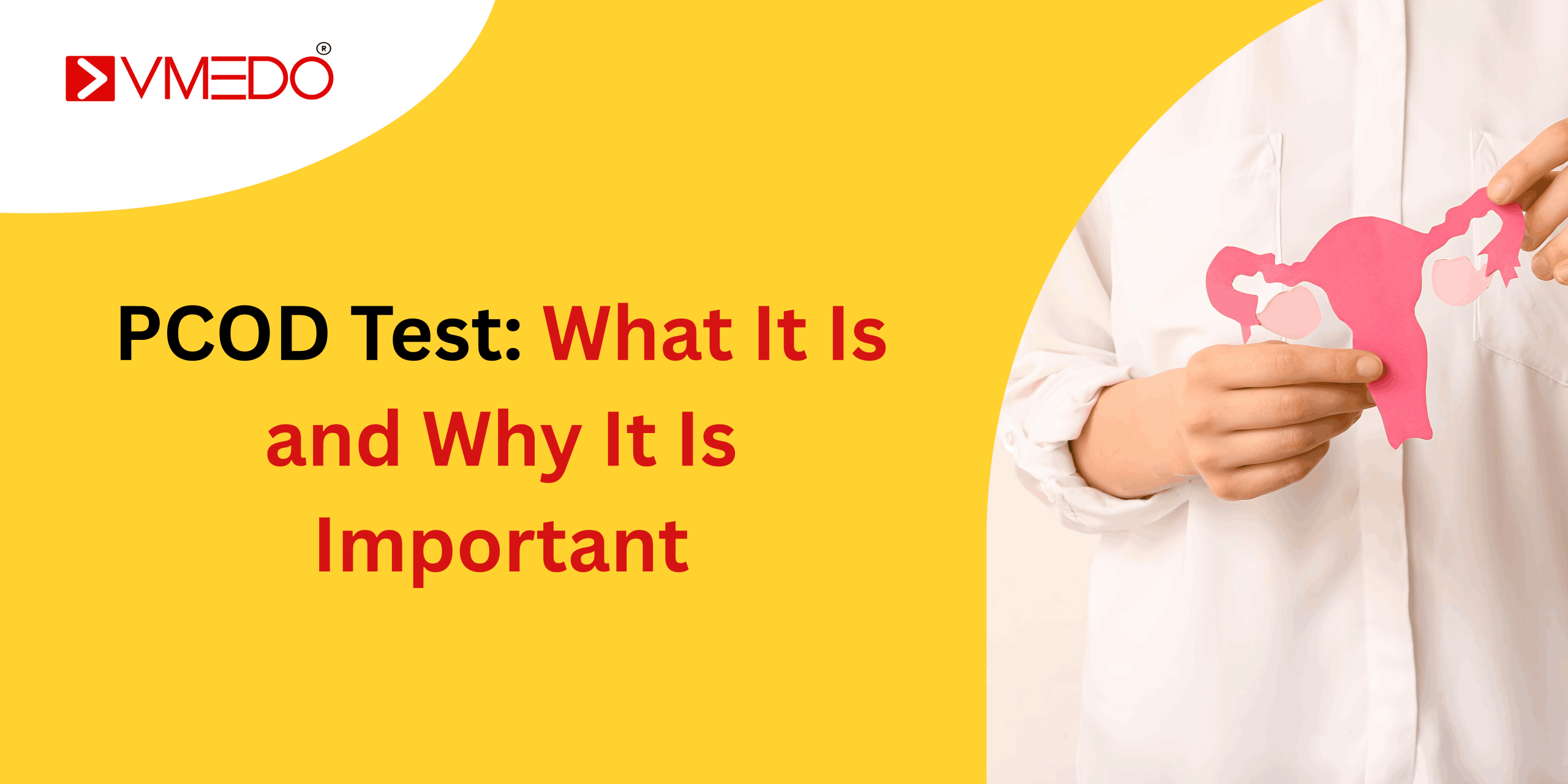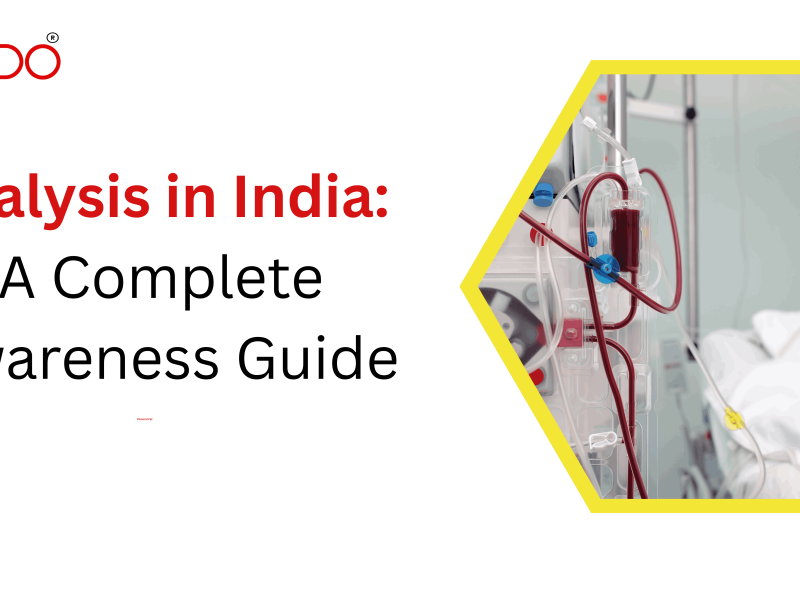Polycystic Ovarian Disease (PCOD) is rapidly becoming one of the most common health concerns affecting women, especially in urban India. Despite its growing prevalence, PCOD often goes undiagnosed due to a lack of awareness and the normalization of symptoms like irregular periods, weight gain, and acne. What many women don’t realize is that these seemingly minor issues could be signs of a deeper hormonal imbalance that, if ignored, may lead to serious health complications. That’s where a PCOD test becomes crucial. By identifying the condition early through the right tests, women can take proactive steps toward managing their health, improving fertility, and preventing long-term risks. In this blog, we’ll break down everything you need to know about PCOD testing—what it involves, why it matters, and how VMEDO is making it easier with convenient home testing services.
What is PCOD (Polycystic Ovarian Disease)?
Polycystic Ovarian Disease (PCOD), also known as Polycystic Ovary Syndrome (PCOS), is a hormonal disorder characterized by irregular periods, excessive androgen levels (male hormones), and the presence of multiple cysts in the ovaries.
Women with PCOD may have enlarged ovaries containing many small fluid-filled sacs (follicles) that surround the eggs. The hormonal imbalance prevents regular ovulation and affects menstrual cycles, fertility, and even mental well-being.
How Common is PCOD?
PCOD affects 1 in 5 women in India. It can begin soon after puberty and may become apparent through symptoms like irregular menstruation or acne. Though not life-threatening, if left unmanaged, it can lead to complications such as infertility, diabetes, obesity, and heart problems.
Symptoms of PCOD
Recognizing the symptoms early is key. Common signs include:
-
Irregular or missed periods
-
Excess facial or body hair (hirsutism)
-
Weight gain or difficulty losing weight
-
Acne or oily skin
-
Thinning hair or hair loss from the scalp
-
Darkening of skin, particularly around neck creases and armpits
-
Difficulty getting pregnant (infertility)
-
Mood swings, depression, or anxiety
What Causes PCOD?
The exact cause of PCOD is unknown, but factors include:
-
Insulin resistance: High insulin levels can increase androgen production, interfering with ovulation.
-
Genetics: A family history of PCOD increases the risk.
-
Hormonal imbalance: Elevated levels of androgens lead to physical symptoms like acne and excessive hair growth.
-
Inflammation: Low-grade inflammation may also trigger androgen production.
What is a PCOD Test?
A PCOD test is not one single test but a combination of diagnostic procedures that help healthcare providers determine whether a woman has PCOD. These tests assess hormone levels, ovarian health, and rule out other conditions.
1. Blood Tests
-
Hormone Tests:
-
Luteinizing hormone (LH)
-
Follicle-stimulating hormone (FSH)
-
Testosterone (Total and Free)
-
DHEA-S (Dehydroepiandrosterone sulfate)
-
Prolactin
-
Estradiol
-
TSH (Thyroid Stimulating Hormone)
-
-
Blood Sugar and Insulin:
-
Insulin resistance test (HOMA-IR)
-
HbA1c
-
-
Cholesterol
-
Triglycerides
-
HDL and LDL levels
-
These blood tests help evaluate hormonal imbalances, thyroid issues, insulin resistance, and risk of diabetes or heart disease.
2. Pelvic Ultrasound
An ultrasound, especially a transvaginal ultrasound, checks the size of the ovaries and detects the presence of cysts. It can also help identify thickening of the uterine lining, which is common in women with prolonged missed periods.
3. Physical Examination
Doctors also consider:
-
BMI (Body Mass Index)
-
Waist-to-hip ratio
-
Signs of excessive hair growth or acne
Why is the PCOD Test Important?
1. Early Detection = Better Management
Timely Diagnosis allows women to manage PCOD effectively through lifestyle changes and medical intervention. Early treatment can prevent complications such as infertility, diabetes, and cardiovascular diseases.
2. Regulating Menstrual Cycles
Untreated PCOD can lead to prolonged irregular periods or complete cessation of menstruation, which can affect fertility. Diagnosis helps in regulating menstrual cycles with the help of medications or lifestyle interventions.
3. Fertility Planning
Women who wish to conceive but face difficulties due to PCOD can take appropriate fertility treatments based on test results. Timely intervention can increase the chances of conception.
4. Preventing Long-Term Complications
If left untreated, PCOD can lead to:
-
Type 2 diabetes
-
Hypertension
-
Obesity
-
Sleep apnea
-
Endometrial cancer
Testing for PCOD reduces the risk of these long-term health issues.
Who Should Take a PCOD Test?
Women experiencing the following should consider a PCOD test:
-
Irregular periods (less than 8 cycles a year)
-
Severe acne, especially after adolescence
-
Excessive hair growth on face, back, chest, or arms
-
Difficulty in conceiving
-
Unexplained weight gain or obesity
-
Darkened skin patches around neck or armpits
-
Hair thinning or hair fall from the scalp
If you are experiencing any of these, it’s advisable to consult a gynecologist and undergo a PCOD test.
Managing PCOD After Diagnosis
Diagnosis is only the first step. PCOD requires a combination of medical treatment and lifestyle changes.
1. Lifestyle Modifications
-
Weight Management: Even a 5-10% reduction in weight can regulate menstruation and improve fertility.
-
Exercise: Aim for at least 30 minutes of moderate activity 5 days a week.
-
Healthy Diet: Focus on low-GI foods, lean proteins, green leafy vegetables, and whole grains.
-
Sleep and Stress Management: Poor sleep and stress aggravate hormonal imbalance. Aim for 7-8 hours of quality sleep and include mindfulness practices.
2. Medications
-
Birth control pills: Regulate periods and reduce androgen levels.
-
Metformin: Improves insulin sensitivity and helps with weight management.
-
Clomiphene or Letrozole: Used for ovulation induction in women trying to conceive.
-
Anti-androgens: Control excess hair growth and acne.
Always consult a healthcare provider before starting or stopping any medication.
Conclusion
PCOD is more than just a hormonal disorder—it’s a signal from your body that it needs attention, care, and balance. While the symptoms may seem manageable at first, delaying diagnosis and treatment can lead to serious long-term consequences like infertility, diabetes, and heart disease. That’s why getting a comprehensive PCOD test is not just important—it’s essential.
By understanding your body and identifying PCOD early, you can take control of your health journey with confidence. Whether it’s regulating your menstrual cycle, planning for pregnancy, or simply improving your overall well-being, early diagnosis is the key to effective management.
At VMEDO, we’re committed to making healthcare simple, accessible, and personalized. With our PCOD test at home services, you can get diagnosed from the comfort of your home—safely, affordably, and without the hassle of long hospital visits.
Don’t wait for the symptoms to get worse. Listen to your body. Take the first step towards a healthier tomorrow.



